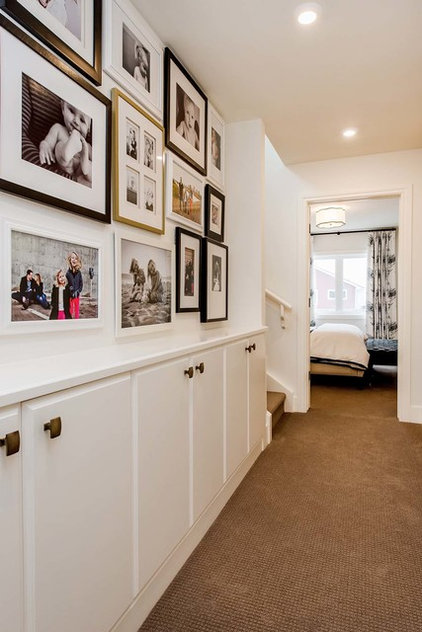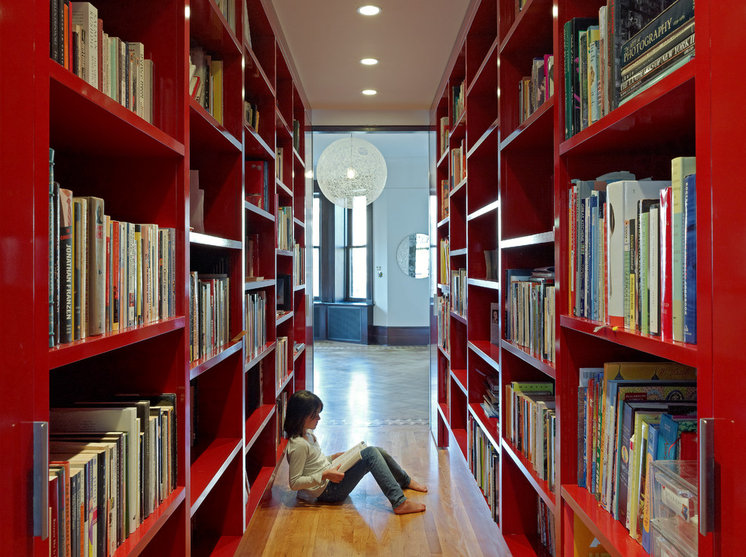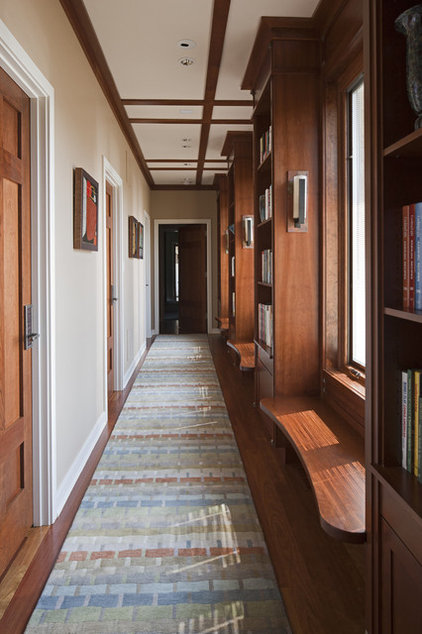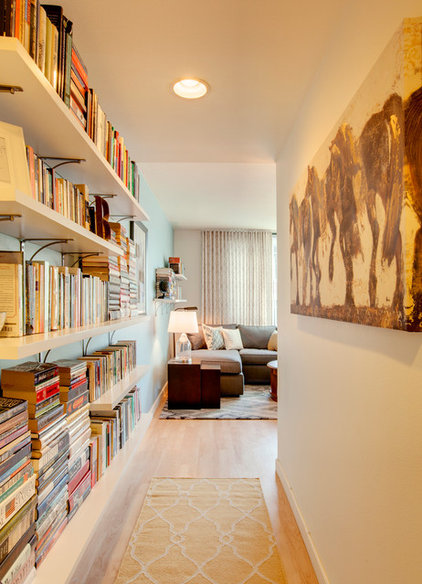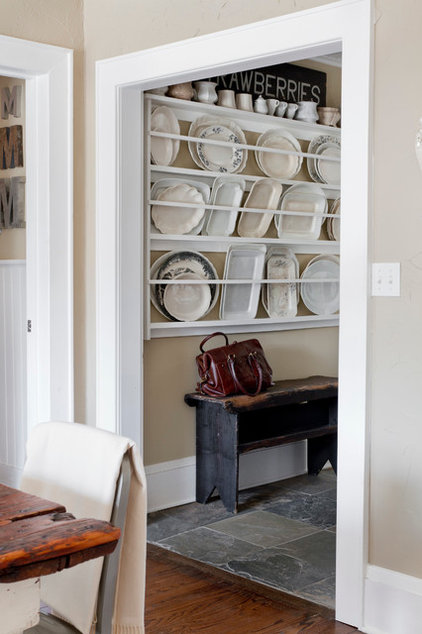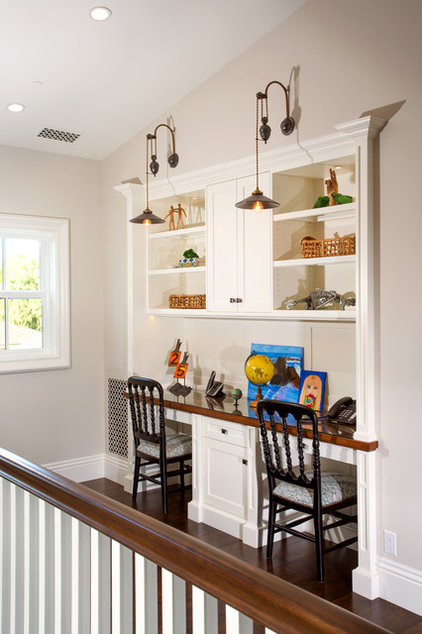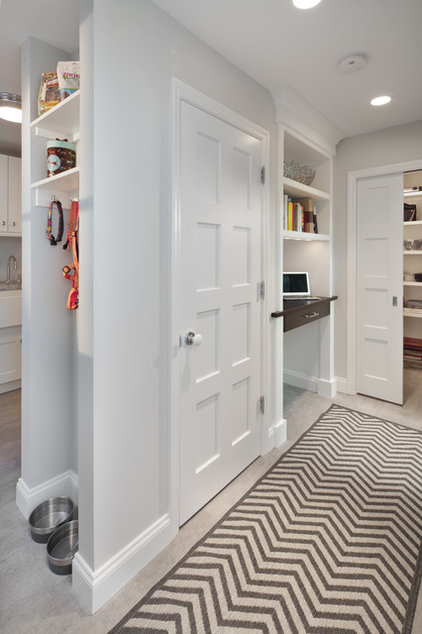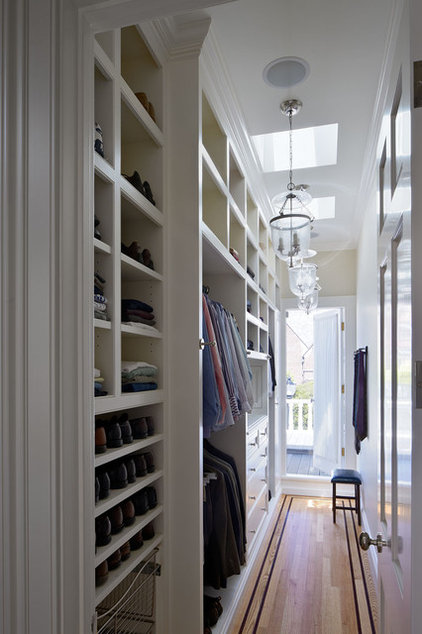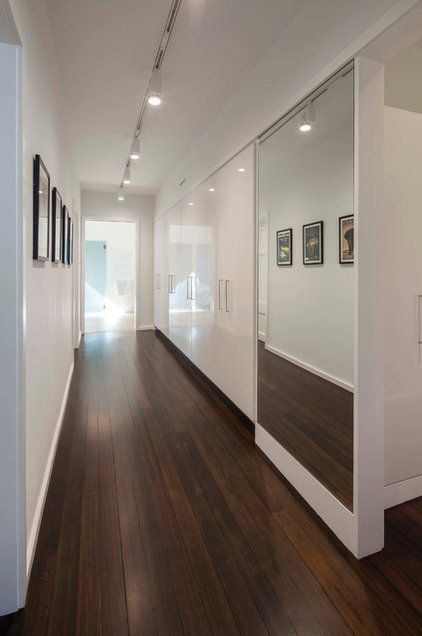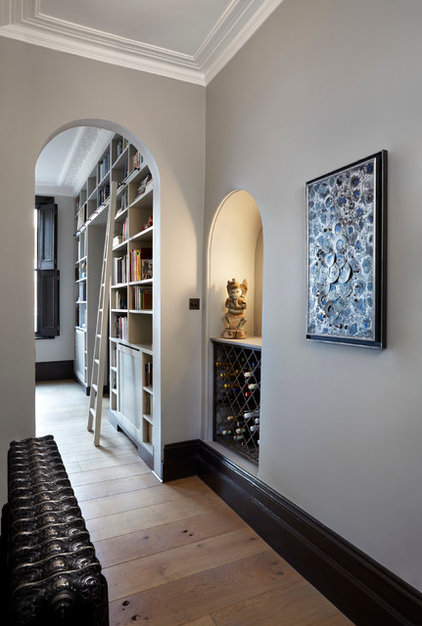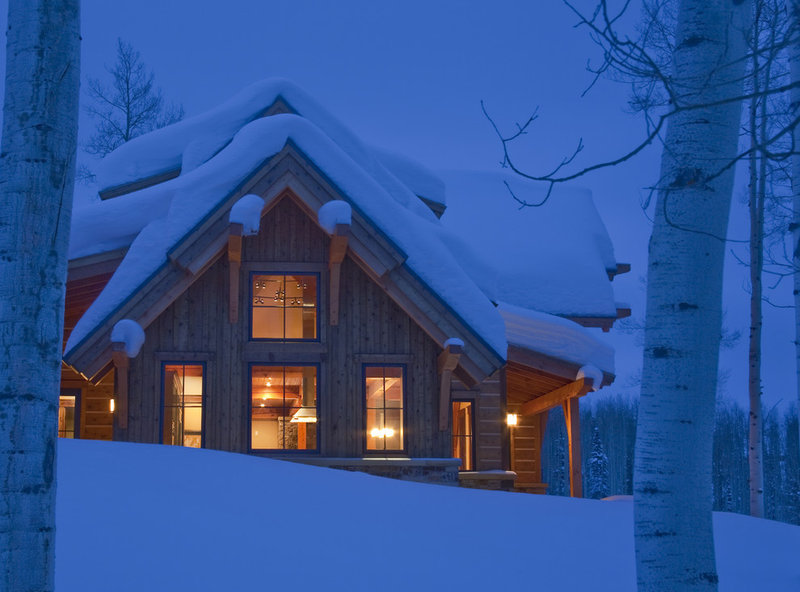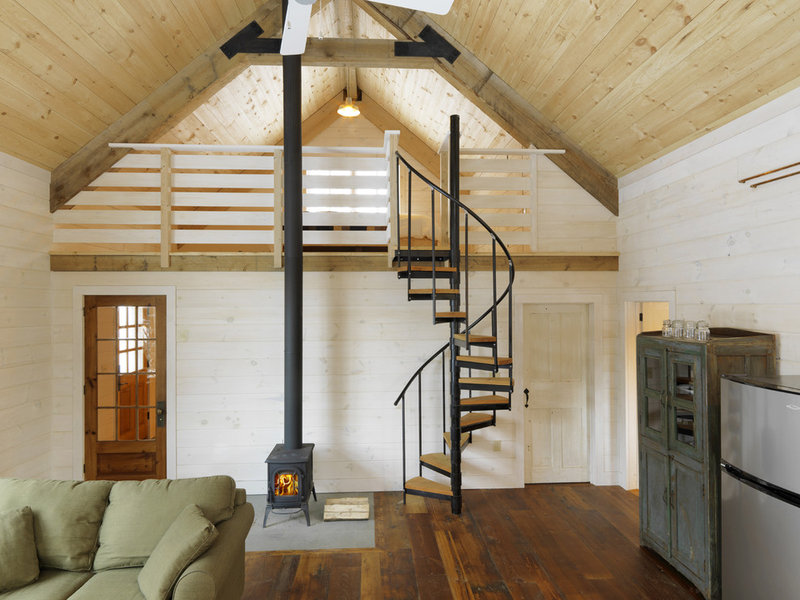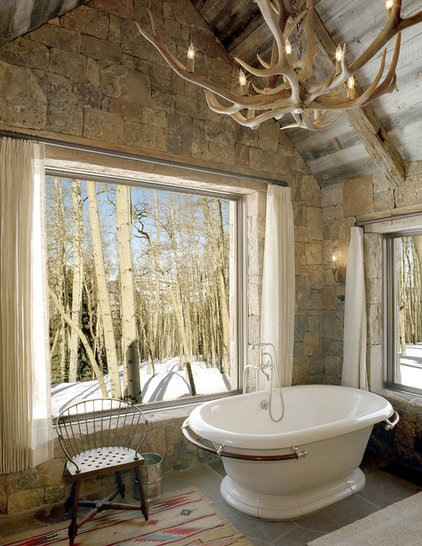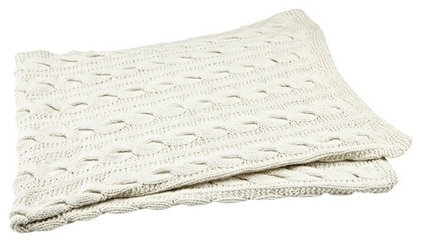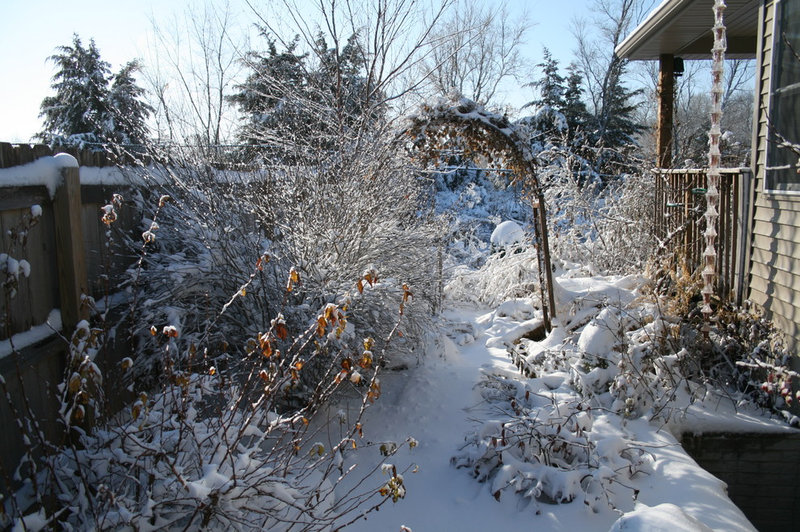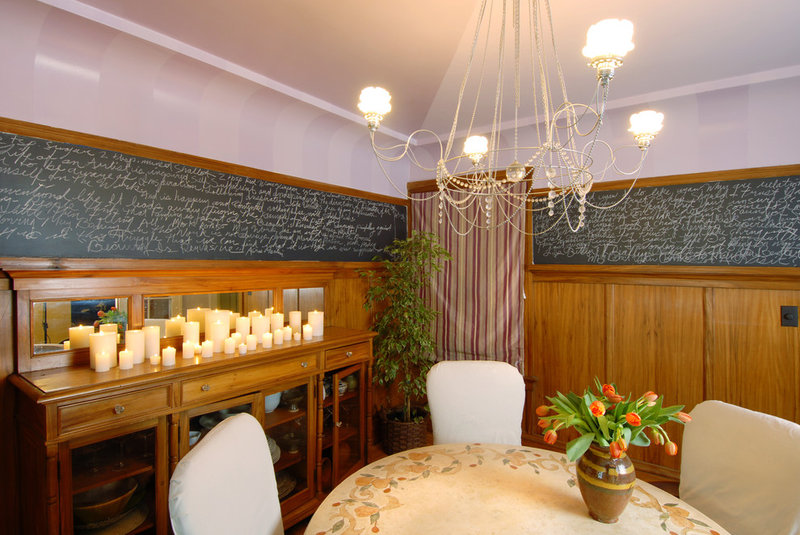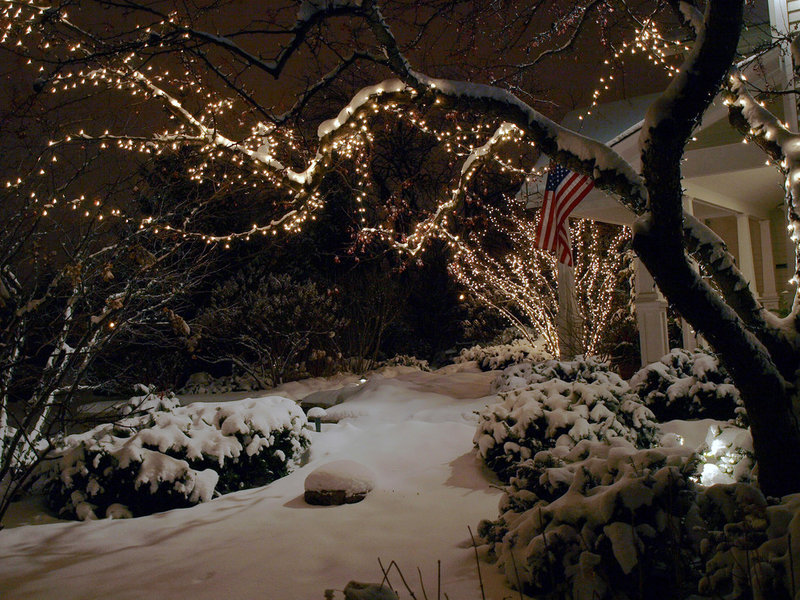The Hardworking Home: Halls can do more than connect rooms. Here are hallways that house bookcases, cabinets, office space and more
By Laura Gaskill - Houzz Contributor
How hard does your hallway work? If it does little more than
provide a way to get from point A to point B, consider if you could use
your hall for something more. From simple DIY wall-mounted storage to
custom bookshelves and built-in workstations, here’s how to get the
hardworking hallway your home deserves.
Hardworking space: The hallway
The challenge: Hallways connect rooms but often lack a dedicated function of their own. In a hardworking home, every inch of space counts. Make sure your hall does its part by incorporating smart storage features that fit your home and your budget.
Good to know: When weighing options for modifying your hallway, keep in mind that it’s important not to shrink your hallway to less than 36 inches wide, for accessibility and comfort.
Hardworking space: The hallway
The challenge: Hallways connect rooms but often lack a dedicated function of their own. In a hardworking home, every inch of space counts. Make sure your hall does its part by incorporating smart storage features that fit your home and your budget.
Good to know: When weighing options for modifying your hallway, keep in mind that it’s important not to shrink your hallway to less than 36 inches wide, for accessibility and comfort.
Design idea: Add wall-mounted cabinets.
Why: Add storage with slim cabinets without building into the wall. Unlike ceiling-height storage, wall-mounted cabinets allow room to hang artwork on the wall above and allow a bit more breathing space in a narrow passageway.
How: Off-the-shelf versions can be purchased from local home improvement stores or Ikea, for DIY or pro installation. For tricky spaces or to achieve a specific look, hire a cabinetmaker to design and install custom units.
Cost: Prefabricated cabinets for DIY installation can cost $200 to $500 and up. You can expect to hire a handyperson for two to four hours of work for a small to medium-size hall, at a rate of $30 to $125 per hour, depending on rates in your region and the person’s experience and qualifications. Custom cabinetry can cost $400 and up per linear foot, including installation.
DIY tip: Before purchasing cabinets, carefully measure your space, taking into account the door swing needed for the cabinets to open.
Why: Add storage with slim cabinets without building into the wall. Unlike ceiling-height storage, wall-mounted cabinets allow room to hang artwork on the wall above and allow a bit more breathing space in a narrow passageway.
How: Off-the-shelf versions can be purchased from local home improvement stores or Ikea, for DIY or pro installation. For tricky spaces or to achieve a specific look, hire a cabinetmaker to design and install custom units.
Cost: Prefabricated cabinets for DIY installation can cost $200 to $500 and up. You can expect to hire a handyperson for two to four hours of work for a small to medium-size hall, at a rate of $30 to $125 per hour, depending on rates in your region and the person’s experience and qualifications. Custom cabinetry can cost $400 and up per linear foot, including installation.
DIY tip: Before purchasing cabinets, carefully measure your space, taking into account the door swing needed for the cabinets to open.
Design idea: Make a hallway library.
Why: Siting a book collection in the hall makes for great storage possibilities and easy perusing. From simple ready-made shelves to a custom design solution, bookshelves are one of the most versatile yet straightforward hallway upgrades.
How: For a custom built-in like the one shown here, hire a carpenter or cabinetry professional to craft bookcases that fit your hall (and your book collection) exactly.
Cost: Custom bookcases for a hall can cost $2,000 to $4,000 and more, depending on the size of your hall, local rates and the choice of materials.
Why: Siting a book collection in the hall makes for great storage possibilities and easy perusing. From simple ready-made shelves to a custom design solution, bookshelves are one of the most versatile yet straightforward hallway upgrades.
How: For a custom built-in like the one shown here, hire a carpenter or cabinetry professional to craft bookcases that fit your hall (and your book collection) exactly.
Cost: Custom bookcases for a hall can cost $2,000 to $4,000 and more, depending on the size of your hall, local rates and the choice of materials.
More custom options: If
your hall has windows, consider using the space below for built-in
window seats, with or without hidden storage. Slender bookcases between
the windows can be outfitted with sconces to provide light, making the
hall an inviting reading spot. Note that if you will be adding or moving
electrical work, you will probably need a permit.
DIY solution: For a
fast, budget-friendly hallway upgrade, add wall-mounted floating or
bracket shelves. Shelves are available in different widths.
How: Use a stud finder to locate the wall studs and mark them with a pencil. Using a level and pencil, mark where you want each shelf to be before you begin. Try to attach at least one shelf support on each shelf to a stud — if you can’t get fasteners into a stud, get appropriate anchors for your wall type (ask at a hardware store).
Cost: Floating or bracket shelves can cost as little as $5 apiece and up to $100 or more, depending on the size and material. For a semi-DIY option, you can purchase the shelves and then hire a handyperson to install them, at a rate of $30 to $125 per hour. An experienced pro should be able to install a simple set of shelves in about an hour.
8 Beautiful Ideas for Floating Shelves
How: Use a stud finder to locate the wall studs and mark them with a pencil. Using a level and pencil, mark where you want each shelf to be before you begin. Try to attach at least one shelf support on each shelf to a stud — if you can’t get fasteners into a stud, get appropriate anchors for your wall type (ask at a hardware store).
Cost: Floating or bracket shelves can cost as little as $5 apiece and up to $100 or more, depending on the size and material. For a semi-DIY option, you can purchase the shelves and then hire a handyperson to install them, at a rate of $30 to $125 per hour. An experienced pro should be able to install a simple set of shelves in about an hour.
8 Beautiful Ideas for Floating Shelves
Design idea: Platter storage and display.
Why: A wall-mounted plate rack can provide overflow storage for dishes and platters, and can take the place of wall art.
How: Plate racks can be purchased ready made or built from scratch by a carpenter or handyperson. If you’re installing plate racks yourself, locate a wall stud and attach the plate rack to a stud in at least one place if possible. If you cannot attach it to a stud, ask a staffer at a local hardware store to advise you about the best anchor for your walls.
Cost: Plate racks cost from $50 to $200 and up. Expect to pay a carpenter from $250 to $400 and up to design and construct a custom plate rack for your hall.
Why: A wall-mounted plate rack can provide overflow storage for dishes and platters, and can take the place of wall art.
How: Plate racks can be purchased ready made or built from scratch by a carpenter or handyperson. If you’re installing plate racks yourself, locate a wall stud and attach the plate rack to a stud in at least one place if possible. If you cannot attach it to a stud, ask a staffer at a local hardware store to advise you about the best anchor for your walls.
Cost: Plate racks cost from $50 to $200 and up. Expect to pay a carpenter from $250 to $400 and up to design and construct a custom plate rack for your hall.
Design idea: Add a recessed workspace.
How: You may not be able to add a recessed desk to a typical hall wall, unless the wall already contains a closet, in which case there could be some hidden space there. Have a contractor take a look to find out what your options are. If your hall is wide enough, you may still be able to add a built-in desk, even if it can’t be fully recessed.
How: You may not be able to add a recessed desk to a typical hall wall, unless the wall already contains a closet, in which case there could be some hidden space there. Have a contractor take a look to find out what your options are. If your hall is wide enough, you may still be able to add a built-in desk, even if it can’t be fully recessed.
Where this works: Entry
halls and other passages that get a lot of traffic are not the best
choice for a workspace, unless the hall is exceptionally wide. A better
spot is a hall located off the kitchen, or in a rear area of the house
with lower traffic. In this hall a small workstation is tucked beside a
hall closet around the corner from the kitchen, providing a convenient
workspace and storage above.
Cost: The cost of adding a hallway workspace is similar to that for custom bookcases — from $1,200 to $4,000 and up, depending on the size of your hall, local rates and the choice of materials.
Cost: The cost of adding a hallway workspace is similar to that for custom bookcases — from $1,200 to $4,000 and up, depending on the size of your hall, local rates and the choice of materials.
Design idea: Boost clothes storage.
Why: Whether you have limited bedroom closet space or have a large collection of clothes or shoes overflowing from your regular closets, customizing a hallway to accommodate wardrobe needs can be a big help.
How: Depending on the size of your hallway and your storage needs, the clothes storage zone can be as simple as a few valet rods or as complex as a fully custom storage system. If you will be outfitting the space yourself, look for components that look good on display.
Cost: Individual closet components for DIY installation can cost between $50 and $300 per piece. Custom storage varies in cost depending on the materials used and the pro’s experience and location, but can run $1,200 to $5,000 or more.
Why: Whether you have limited bedroom closet space or have a large collection of clothes or shoes overflowing from your regular closets, customizing a hallway to accommodate wardrobe needs can be a big help.
How: Depending on the size of your hallway and your storage needs, the clothes storage zone can be as simple as a few valet rods or as complex as a fully custom storage system. If you will be outfitting the space yourself, look for components that look good on display.
Cost: Individual closet components for DIY installation can cost between $50 and $300 per piece. Custom storage varies in cost depending on the materials used and the pro’s experience and location, but can run $1,200 to $5,000 or more.
Design quandary: Open or closed storage?
Open storage (as in the last photo) has the advantage of being easy to
access and a boon for visual organizers. If your hall is in an area with
lower traffic, open storage can be a good choice. For areas that get
more foot traffic, consider closed storage because it has a neater,
sleeker look. The hall shown here got a major storage boost with closed
closets, while a full-length mirror provides a convenient
outfit-checking spot.
Design idea: Wine storage niche.
How: Install a wine rack in an existing hall niche to house a growing collection of bottles, or have a new niche made specifically for the purpose. If you’re using an existing niche, measure carefully. Depending on the dimensions of your niche, you may be able to use ready-made wine racks; otherwise hire a carpenter or handyperson to craft a wine rack to fit your space.
Cost: Ready-made wine racks can be purchased for $20 to $100 and up per piece. If you need to have a new niche created, expect to pay a carpenter $300 to $500 and up.
How: Install a wine rack in an existing hall niche to house a growing collection of bottles, or have a new niche made specifically for the purpose. If you’re using an existing niche, measure carefully. Depending on the dimensions of your niche, you may be able to use ready-made wine racks; otherwise hire a carpenter or handyperson to craft a wine rack to fit your space.
Cost: Ready-made wine racks can be purchased for $20 to $100 and up per piece. If you need to have a new niche created, expect to pay a carpenter $300 to $500 and up.
